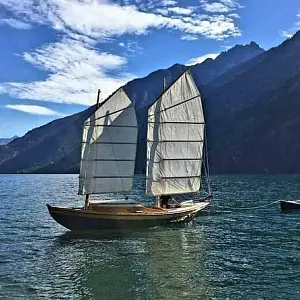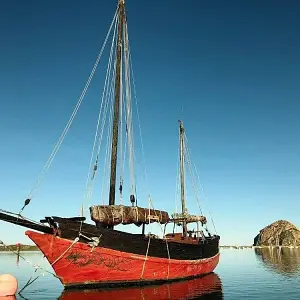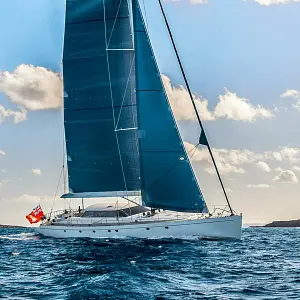Built by Whangarei Engineering Construction (WECO) in 1975 this traditional ketch motorsailer ODYSSEY has a steel hull, aluminum masts, and steel wire rigging. Built originally as a private yacht by a shipbuilder in New Zealand.
Built by Whangarei Engineering Construction (WECO) in 1975 this traditional ketch motorsailer ODYSSEY has a steel hull, aluminum masts, and steel wire rigging. Built originally as a private yacht by a shipbuilder in New Zealand.
Since 1992 ODYSSEY has circumnavigated the globe several times during her service as a whale and ocean research vessel and has been featured in 9 documentaries and the IMAX film WHALES, performing research and hosting educational programs from Papua New Guinea to Boston.
The vessel accommodates up to 12 people comfortably for extended passages. Accommodations include three double berth cabins and an owner’s cabin at the aft of the vessel, with three additional berths and the captain’s quarters up forward.
Walkthrough
Starting in the forward v-berth crew cabin and moving aft, the vessel has two stacked berths on the port and another single berth on the starboard side, with crew storage located underneath. Moving through the bulkhead aft, the starboard side opens up to the captain's quarters, which has an elevated bunk, desk, and storage.
Directly opposite on the port side, is a general storage area containing two separate freezers. The next compartment is the galley, which contains a conventional propane fired stove, a microwave, and a standing refrigerator, plus a double sink, two additional under-counter refrigerator spaces, and plenty of storage for food, pots, pans and utensils. Moving aft and up a companionway, the salon opens up with windows on three sides. On the port side is a dining table, with booth seating on one side and a bench/storage container on the other. On the starboard side a desk runs the length of the salon with separate workstations used by on-board scientists during research. Seating is provided by a bench/storage container running the length of the desk.
Along the aft bulkhead of the salon there are two companionways, one going up to the pilothouse and the other going down to the aft cabins. Moving up the port side companionway, the pilot house opens up to a helm station with all navigation and communication instrumentation at the ready. Access to the outside of the vessel is through one of two sliding wood companionway doors situated on both the port and starboard sides.
The engine room entrance is located just outboard of the helm station on the starboard side, hidden from view under a small seating area. Tool storage is located under all of the seating areas in the pilothouse, as well as in the various storage lockers located under the helm station and along either side of the pilothouse. On the starboard side, aft section of the pilothouse is a small science station. This station has stainless steel counter tops and a sink, with a refrigerator and storage space located below the counter top and more storage located above. On the port side, directly opposite the science station is a navigation station. All electrical system controls are accessed from a panel in the center of the pilothouse’s aft bulkhead, situated between the science and navigation stations. Heading back to the salon and down the center companionway, the first of three double berth cabins is located on the port side.
The berths are stacked one on top of the other with a small closet and drawers for clothing and toiletry storage, as well as a sink and mirror on the aft bulkhead. There is additional storage beneath the bottom berth. On the opposite side of the vessel is the main head, containing a toilet, Miele washer and dryer, sink, shower, and plenty of storage space. Moving aft down the hallway, you will find two more double berths, one on either side of the vessel, and finally the aft cabin opens up directly ahead. Entering the aft cabin, a second head is located on the starboard side, with a queen-size berth positioned just aft, behind a bulkhead. The remainder of this aft cabin has been converted into a high-seas laboratory and currently contains a selection of research equipment.
Crew Quarters
Quarters, for 4 or 5 people, are forward of the Galley. Captain's quarters are a separate cabin on the starboard side, which includes a desk and equipment storage. Three crew berths are contained in the v-berth.
Engine Room
The engine room entrance is located on the starboard side of the pilot house. A hatch opens up to a ladder leading down to below the salon.
Entering the engine room, the bilge pumps, tools and water maker are located on the starboard side, with the main engine centered in the middle of the room. In front of the main engine is a 40 gallon hydraulic tank for the onboard hydraulic systems which include a bow thruster, self-priming bilge pump, and crane.
Directly to the left (port) upon entering the engine room, fixed to the aft bulkhead is the battery and shore power/generator control switches and main breakers.
Along the forward bulkhead is the Vetus 13.5kW generator, air conditioning system, and various fuel filter systems.
The Yanmar 22kW generator is situated on the port side of the engine room with a path providing access between the hull and the generator. If the need arises to replace larger pieces of equipment, the salon floor and roof have hatches that can be opened to provide direct access engine room from the outside.
Generators
Deutz/Vetus 13.5kW generator
Yanmar 22kW generator – new winter 2013
Tanks
Fresh Water Tanks: 1200 US Gallons (plus HRO Safari Watermaker, 500 gal/day) 4 Fuel Tanks totaling: 3200 US Gallons, Plus a Day Tank 90 Gallons
Navigation
Furuno Color Radar (48 mile range) – new 2013
NorthStar 6001: Integrated Chart Plotter/Radar/Depth Sounder and Satellite Weather
Autopilot: Simrad AP 70 – new 2013
Furuno FCV-292 Deepwater depth sounder
Cetrek Windspeed, Direction, Depth, Hull Speed and Water Temperature gauge
Davis 6250 Vantage Vue Weather station
Communications
VSAT, ICOM M-600 Transceiver
Apelco VHF
Four VHF HH
Iridium Satellite Hand Held Phone
Electrical Systems
220V AC Single Phase (60Hz); 110V AC (60Hz); Isolated System with ground fault detector
24V DC; 12V DC
4 sets of heavy-duty, dry-gel 24V battery banks :2200 Amps hrs
Two 2500-Watt Sine wave Isolated Inverters
Deck Equipment
Crows Nest – allows observer to stand 72 ft. above water
Observation Platform on main mast – allows observer to stand 42 ft. above water
Observation Platform on Pilot House – allows observer to stand 14 ft. above water
Dive Steps and Platform on Port side – accommodates one diver in full gear, walk in walk out
14’ 4” Rigid-bottom Zodiac Inflatable with 40hp 4-stroke Honda outboard
Large inventory of spare parts in spacious Lazarette
Additional Equipment
Cell Culture Laboratory
Equipment Sertilguard e3, Biological Safety Cabinet
Vision Cellometer
Compound Video Microscope
Refrigerated Centrifuge
Incubator
Two -20° Freezers
Dissection Kits
Preservation Chemicals
Biopsy Equipment Whale Boom- used for attaching research tags, securing biopsy samples or as a film platform
AMCO VEBA 2 Ton Hydraulic Crane on aft deck – for deployment and recovery of various ocean instrumentation
Safety Equipment
Three Satellite EPIRBS
14 Life Jackets
Three Life Rings
Alert 2 MOB System w/ MOB pole and light
Two Zodiac MC Class 3 Open Sea 8-person offshore life rafts
Manual Halon extinguisher System for Engine Room
10 Class B Hand-held fire extinguishers
Multiple Abandon Ship bags with assorted survival gear








